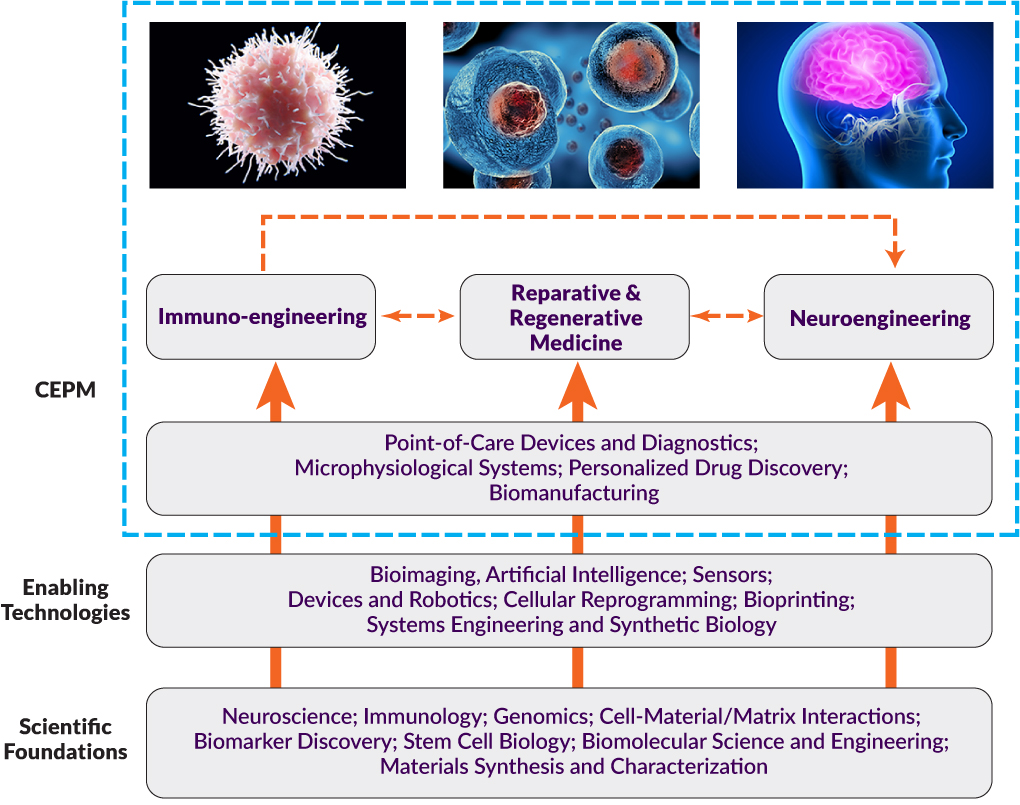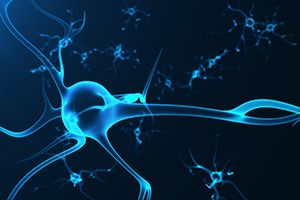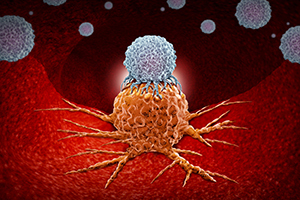Research Programs
New technologies are accelerating breakthroughs in the basic biomedical sciences, advancing new and more precise therapeutic interventions, and leading to unprecedented gains in human health and well-being. Nowhere is this more critical than in precision medicine, which integrates the fundamental complexity of biological systems (e.g., genomics, proteomics, metabolomics, and systems analysis), data science and analytics, and engineering science and technologies to provide more accurate and precise treatment modalities to patients. The more complex the disease, the more distinct are the number of disease variations even to the level of the individual patient. This increasing complexity, together with the need for a high degree of accuracy, precision, and computation, requires skills that lie at the heart of engineering and engineering science.
The Center for Engineering and Precision Medicine (CEPM) sits at the interface of biological and engineering sciences with clinical translation (Figure 1). The center builds on a wealth of enabling and multiscale technologies pioneered by researchers at Mount Sinai and Rensselaer at the nexus of medicine, engineering, and data analytics/artificial intelligence. This confluence of scientific and technological expertise is being targeted toward specific translational applications, including minimally invasive control and regulation of neural circuity, engineering the immune system to treat cancer and infectious disease, and on-demand personalized tissue repair and regeneration. This research requires a co-location of engineering with biomedical science and an undergirding clinical enterprise, leading to both basic understanding of disease mechanisms and opportunities for therapeutic interventions and improvement in clinical care.

Figure 1. From fundamental research at Rensselaer and Mount Sinai to translational medicine.
CEPM focuses on three core research directions: neuroengineering, immunoengineering, and reparative and regenerative medicine. This research comprises two-thirds of the $42 billion National Institutes of Health external research budget. The translation from basic and applied research into patient care is a key outcome of CEPM, as represented in Figure 2. Core research in biosciences and biomedicine, bioimaging, artificial intelligence, and machine learning, modeling and simulations of complex systems, and new materials development provide a fundamental undergirding that enables a host of biosystems and processes that advance clinical translation in areas of immediate relevance in today’s medicine.
Neuroengineering

Vision
Minimally invasive control and regulation of neural circuitry
Key CEPM Expertise
Circadian disruption (CD), magnetogenetics, drug delivery systems
Neuroimaging, deep brain stimulation, non-invasive neuro-modulation, brain network analyses, neurosurgical guidance, optogenetics
Future Areas Of Growth
Neuroscience, Nanorobotics, neuroimaging
Immunoengineering

Vision
Engineer immune system to treat cancer and infectious diseases
Key CEPM Expertise
Bioprocessing, Structural biology, AI/Bioinformatics, Nanomedicine
UVC for COVID-19 decontamination, imaging of COVID-19, nanomedicine, trained immunity, artificial intelligence for imaging, informatics
Future Areas Of Growth
Micro-physiological Systems, Biocomplexity, Immunogenomics
Reparative and Regenerative Medicine

Vision
On demand personalized tissue repair and regeneration
Key CEPM Expertise
Biomanufacturing, Cell-ECM/ Matr. Interaction, Robotics
Genomics and stem cells, tissue characterization, image-guided treatment of diseases, neuro re-habilitation, thin film electronics, portable low-cost diagnostic devices
Future Areas Of Growth
Cellular Engineering, Epigenetics/genomics
Figure 2. Core research foci of the Center for Engineering and Precision Medicine (CEPM).
Support CEPM
Coming together to advance a new
kind of medical research
